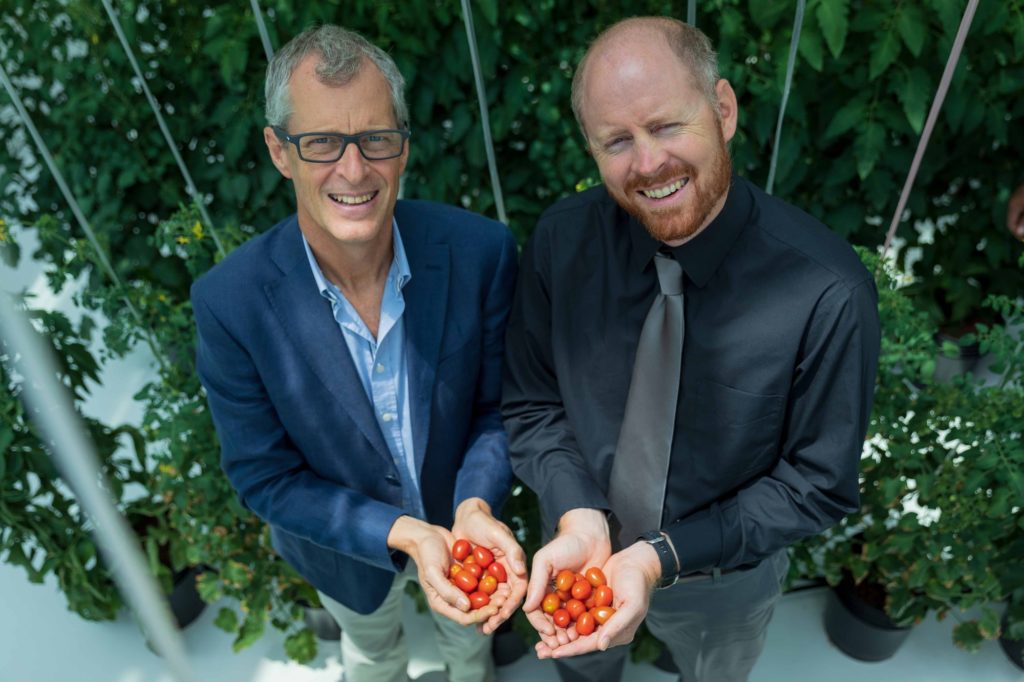It’s no secret that rising populations across the globe are putting a strain on humanity’s essential resources, not least the supply of freshwater. “Around 70% to 80% of the world’s freshwater is used for agriculture, and every aquifer we use for this purpose is being depleted,” explains Mark Tester, who along with Ryan Lefers co-founded Red Sea Farms, one of Saudi Arabia’s brightest startups. “The situation is unsustainable, which means we have to change.”
Mark and Ryan met right here at KAUST, where Mark is Professor of Plant Science, and Ryan is a research scientist specialising in agricultural engineering. Both men demonstrate an evident passion for their subjects, but it’s a shared belief in using their research to effect real, positive change in the world that truly unites them. The particular change that interests them is one of enormous importance not just in Saudi Arabia, but across much of the globe: food security, particularly in water-scarce communities.
Improving food security is a goal of admirably ambitious proportions, but Red Sea Farms has already demonstrated its proprietary technology can go a long way to achieving it. With freshwater supplies under such pressure globally, Mark and Ryan have established an economically viable saltwater-based agricultural system that enables them – and their clients – to grow food using saltwater, rather than freshwater, as the primary input.
It’s relatively common for the founders of startups that come out of KAUST to represent very different disciplines, allowing them to bring varied approaches to bear on a single problem. Red Sea Farms is no exception.

Mark’s world-renowned plant science expertise has seen him develop salt-tolerant crops through selective breeding of wild varieties that exhibit natural salt tolerance. He’s also using genomics, genetics, machine learning, and automated phenotyping – cutting-edge techniques that can achieve the same effect far more quickly. Ryan, on the other hand, focuses on substituting saltwater for freshwater in the various engineering systems that support agriculture in water-scare, hot environments, particularly cooling systems, which can account for up to 90% of the freshwater footprint of a greenhouse.

It’s a winning combination, and their results have been profound. Red Sea Farms aims to use just 10% freshwater in its greenhouses, with the other 90% made up of saltwater. That makes agricultural systems using Red Sea Farms technology cheaper to run and far more sustainable than traditional, freshwater-based systems. There’s also an added side benefit neither of the founders expected when they developed their approach – their crops taste better, too.
The idea for Red Sea Farms was born in Saudi Arabia, a country where average temperatures are high, and water is scarce. Much of the freshwater used for agriculture here is desalinated seawater, which isn’t just expensive to produce at around one dollar per cubic metre, it also takes a heavy environmental toll. Red Sea Farms technologies have global relevance, particularly in places with conditions similar to those found in the Kingdom, including much of the Middle East region, North Africa, India, Australia, and many parts of the USA and Southern Europe.
It’s estimated we as a civilisation will need to grow around two-thirds more food than we do today by 2050. Considering the urgency of this problem, it’s perhaps no surprise that Red Sea Farms is attracting global attention. In 2019, the company placed third in the Misk Entrepreneurship World Cup, a remarkable achievement considering over 100,000 startups from 187 countries entered the competition. The landmark result not only shone an international spotlight on the company’s successes to date, but it also opened important doors, leading to a valuable partnership with Kirchner Groupin Alabama, who are helping the Red Sea Farms co-founders evaluate strategic partnerships and develop growth channels.

Interestingly, of the 100 finalists competing in the Misk Entrepreneurship World Cup, six startups were from Saudi Arabia, and all of those six had KAUST graduates among their founders – an achievement that we’re incredibly proud of.
Like almost all businesses operating in 2020, Red Sea Farms has faced some level of disruption due to the global outbreak of COVID-19. Travel restrictions in the early months of the pandemic limited access to farms and greenhouses, posing challenges in tending crops, some of which were unfortunately lost. However, at the same time, global volatility and supply-chain disruption on this scale have raised awareness of the growing issue of food security that is so central to Red Sea Farms’ mission. This awareness has helped highlight the benefits to be gained from localising food production and increasing sustainability in the agriculture industry – tailwinds that are helping shine even more of a spotlight on the company.
Both Mark and Ryan credit KAUST with making a major contribution in supporting the entrepreneurship ecosystem in Saudi Arabia. “Part of KAUST’s remit is to make sure the cutting-edge research that takes place here makes it out into the world where it can be used for the benefit of the Kingdom and all of humanity,” explained Mark, adding: “It’s a philosophy that’s embedded in every element of life at KAUST, and one Ryan and I share – that’s what Red Sea Farms is all about.”
Red Sea Farms is still a young company. Still, in the space of just a few years, its founders have turned a bold idea into a business that’s changing the way people think about sustainability in agriculture and paving the way for a more food-secure future for all. There will, of course, be challenges ahead. But then, that’s a natural byproduct of trying to change the world.
Whether you’re an entrepreneur or investor, KAUST provides the ideal environment, investment opportunities, mentorship, business training and facilities for success. Learn more about our entrepreneurship programs and offerings.
Learn about TAQADAM Startup Accelerator Program
Discover the KAUST Research and Technology Park
Apply for venture funding from the KAUST Innovation Fund

